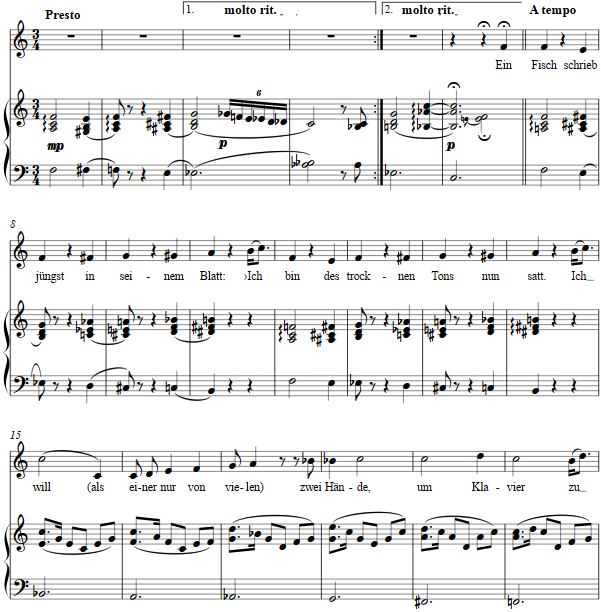Music and Texts of GARY BACHLUND
Vocal Music | Piano | Organ | Chamber Music | Orchestral | Articles and Commentary | Poems and Stories | Miscellany | FAQs
Zivilisatorisches - (2018)
Christian Morgenstern
for medium voice and piano
Ein Fisch schrieb jüngst in seinem Blatt:
›Ich bin des trocknen Tons nun satt.
Ich will (als einer nur von vielen)
zwei Hände, um Klavier zu spielen.
Tief in der Südsee lebt mit Brillen
ein Molch, der tut uns wohl den Willen.
Er teile das Rezept uns mit.
Bad Westerland, Sylt. E. P. Schmidt.‹
Das Blatt verließ die Druckerei.
Der Hering las es wie der Hai.
Fast jeder bis hinauf zum Wal
empfand den Einfall als Skandal,
ja, mehr als das, in seltner Einheit,
als dekadentische Gemeinheit.
(Alleinzig der Polyp sah jetzt,
wozu er in die Welt gesetzt.
Und schwamm herum, von Sinnen schier,
nach einem scheiternden Klavier.)
Der Molch indes mit spitzen Ohren
hat seine Kundschaft nicht verloren:
Er sandte Schmidten die Broschüre
›Fischhände (später Maniküre)
nur durch Gymnastik in drei Jahren‹.
Da war nun alles zu erfahren.
Man sieht, wie da in Westerland
zum Menschen noch der Fisch entbrannt:
die Wunder der Natur, der wilden,
kulturgemäß hinaufzubilden.5 pages, circa 3' 45"
This amusing text is among Morgenstern's Zeitgedichte, and builds a fanciful metaphor perhaps as criticism in part of that human frailty to have many seemingly unattainable goals all the while criticism of such goals is enthusiastically if not viciously rejected for not being somehow "civilized." How then might one define what it is to be....
Civilized
A fish wrote recently in the gazette:
›I'm done with not being wet.
I want (as you, too, might yet)
Piano-playing hands, a set.
In the South Sea deep there lives a newt
Who wear glasses and will to commit
To sharing his methods with all of us.
Bad Westerland, Sylt. E. P. Schmidt.‹
The gazette was hardly published,
Before the herring and the shark,
All schooled, including the whale,
Were scandalized by the remark,
Yes, and more than that, as one,
Judged it a decadent vulgarity.
(The octopus alone saw in this
A worldly, fishy hilarity.It swam seeking, senselessly,
A piano, that maritime rarity.)
The four-eyed newt with the pointed ears,
Not to lose potential clientele,
Posted this brochure to Schmidt:
›Fish hands (manicured as well)
Through exercises in three years.‹
Everything can happen, so it appears.
You see, like there in Westerland,
In man as in fish such flames are fanned:
What was once in Mother Nature's handNow must come under civilized command.
Copyright © 2018 Gary Bachlund All international rights reserved.
The strophes are treated somewhat alike in form, though the latter potions of each go off in slightly different directions. Yet in each, some small citation from Debussy's La Mer is found.. The wonderfully silly text is quite logical in its own way, as for example a newt which must have ears in order to wear glasses. Logical. And of course, were one to find a piano in the ocean, it would indeed be described as "scheiternden." Quite logical. The opening gesture is a simple set of upper and lower voices in opposing motion, proceeding by half-steps. Twelve-toned in an odd and most tonal manner. At the text about hands to play the piano, a crisp rhythm cedes to legato, pianistic arpeggios. Thereafter a snippet from La Mer completes each strophe. As to why the choice of La Mer, while the French and Mediterranean sea coasts are far from Sylt on Germany's noth coast, even more distant is the fish's newt somewhere in the South Pacific.
For other settings of Morgenstern's texts, click here.
The score is available as a free PDF download, though any major commercial performance or recording of the work is prohibited without prior arrangement with the composer. Click on the graphic below for this art song score.

